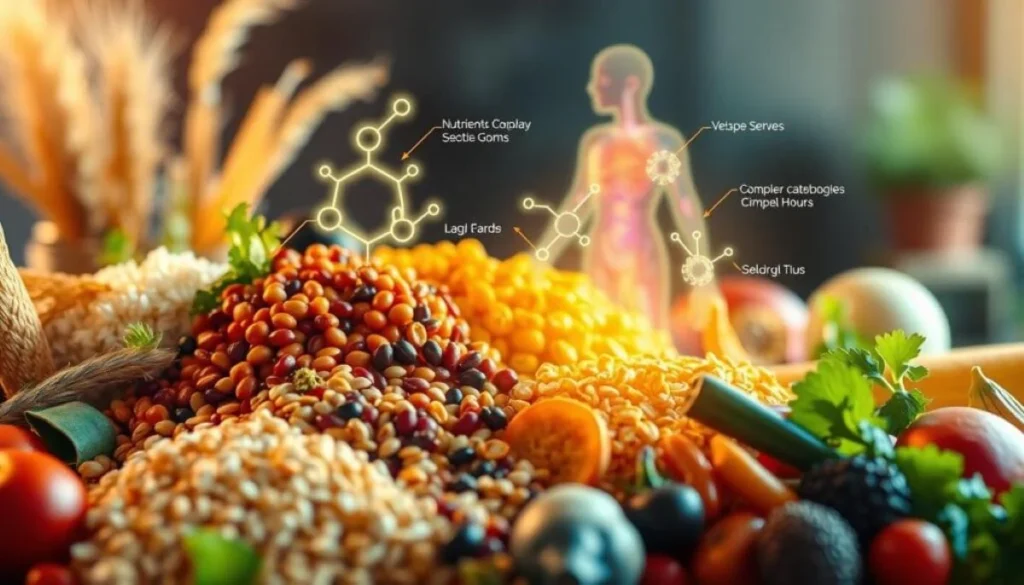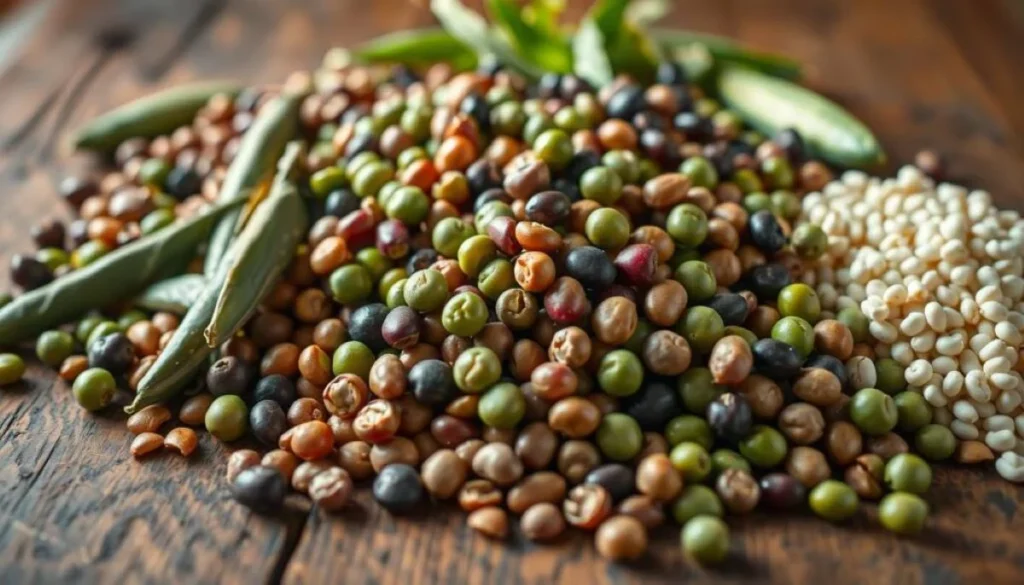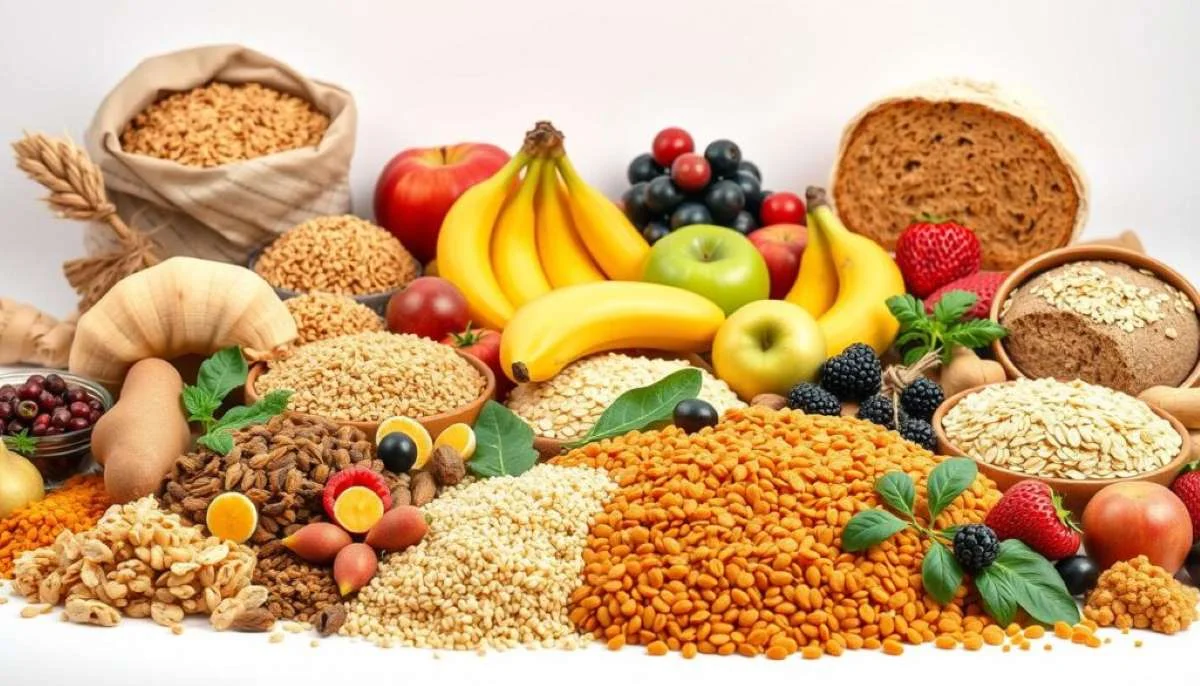High Carbohydrate Foods: Essential Energy Sources
Table of Contents
High Carbohydrate Foods: Essential Energy Sources
Carbohydrates are the body’s main fuel, powering everything from brain function to muscle activity. Foods high in carbs like bread, pasta, and whole grains turn into glucose. This glucose gives us the energy we need for daily activities.
Knowing how carbs work can help you choose better foods. Experts say we should get 45-65% of our daily calories from carbs. This means about 200-300 grams a day for most adults.
Not all carbs are the same. Whole grains, legumes, and complex carbs offer more health benefits than refined or processed ones. Choosing nutrient-rich carbs helps keep your energy steady and supports your health.
Your carb intake is key for keeping your metabolism running, supporting physical performance, and giving you the energy to get through your day.
Understanding Carbohydrates and Their Role in the Body
Carbohydrates are your body’s main energy source. They power your brain and physical activities. These nutrients are key to your health and help you get through the day.
Your body handles different carbs in its own way. Knowing this can help you choose better foods. Whether it’s rice, potatoes, or cereal, you can make informed choices.
Types of Carbohydrates: A Comprehensive Overview
Carbohydrates fall into three main categories:
- Simple Carbohydrates: Quick energy that can raise blood sugar fast
- Complex Carbohydrates: Nutrients that give energy over time
- Fiber: Important for your digestive health
Energy Conversion Process
Your body turns carbs into glucose. This glucose fuels your muscles, brain, and other vital functions. Glycogen in your muscles and liver keeps you ready for physical tasks.
Daily Carbohydrate Recommendations
Experts say carbs should make up 45-65% of your daily calories. For most adults, that’s 225-325 grams of carbs a day. This depends on your body’s needs.
Your brain loves glucose, making carbs vital for thinking clearly.
Choosing whole grains, veggies, and fruits keeps your energy steady. They support your nutritional health too.
High Carbohydrate Foods: Essential Energy Sources
Learning about high carbohydrate foods can change your diet and energy. Carbohydrates are key for fueling your body. They help with brain work and physical activities.
Your diet should have a mix of carbs for nutrition and energy. Choose quality carbs for the best nutrition.
Whole Grains and Cereals: Nutritional Powerhouses
Whole grains are top carbs. They give steady energy without quick blood sugar rises.
- Quinoa: A complete protein with rich carbohydrate content
- Brown rice: Packed with essential minerals
- Oats: High in beta-glucan for heart health
- Corn: A versatile grain with significant carbohydrate levels
Starchy Vegetables and Legumes: Nutrient-Dense Choices
Starchy veggies and legumes have lots of carbs and nutrients. They give fiber, protein, and lasting energy.
- Sweet potatoes: Rich in vitamins and complex carbs
- Lentils: High in protein and fiber
- Chickpeas: Excellent source of plant-based protein
- Corn: A starchy vegetable with significant carbohydrate content
Fruits and Natural Sugars: Sweet Nutritional Delights
Fruits have natural sugars and vitamins. Unlike sweets, they’re good for you.
- Bananas: Quick energy and potassium
- Apples: Fiber-rich with natural sweetness
- Berries: Low in calories, high in antioxidants
While sweets have carbs, they’re not good for you. Stick to whole foods for health and energy.
Benefits of Complex Carbohydrates in Your Diet

Complex carbohydrates are nutritional powerhouses that play a crucial role in maintaining your overall health. These high carbohydrate foods provide sustained energy and essential nutrients your body needs to function optimally. Unlike simple sugars, complex carbohydrates digest slowly, offering a steady release of energy throughout the day.
When you choose complex carbohydrates like whole wheat bread, you’re making a smart nutritional choice. These foods offer multiple health advantages:
- Stabilize blood sugar levels
- Promote digestive health
- Support weight management
- Provide long-lasting energy
Research indicates that complex carbohydrates are packed with important benefits. The Dietary Guidelines for Americans recommend that carbohydrates should comprise 45% to 65% of your total daily calories. This translates to between 225 and 325 grams of carbs for a typical 2,000-calorie diet.
By incorporating complex carbohydrates into your diet, you can enjoy sustained energy, better digestion, and improved overall nutrition. Whole grains, legumes, and starchy vegetables are excellent sources that can help you meet your daily nutritional needs while keeping your energy levels consistent.
Nutritional Value of Whole Grain Sources
Whole grains are packed with nutrients. They offer great health benefits. Knowing the differences between grains helps you make better food choices. Let’s look at some amazing whole grains that can boost your nutrition.
Quinoa: The Complete Protein Carb
Quinoa is a standout cereal because it has complete protein. It has all nine essential amino acids. This makes it a nutritional powerhouse. Unlike many other grains, quinoa has a full protein profile that’s good for muscles and health.
- Contains all nine essential amino acids
- Gluten-free whole grain option
- Rich in minerals and fiber
Brown Rice: Nutrient-Dense Whole Grain
Brown rice is much healthier than white rice. It has more fiber, vitamin B6, and magnesium. This whole grain is great for digestion and gives you lasting energy. Choose brown rice for more nutrients and a tasty cereal base.
Oats: Beta-Glucan Powerhouse
Oats are known for their health benefits, especially beta-glucan. This fiber helps lower cholesterol and control blood sugar. One cup of oatmeal can give you a lot of nutritional support.
Recommendation: Adults should consume at least six 1-ounce servings of grains daily, with half being whole grains.
Starchy Vegetables as Energy Sources
Starchy vegetables are packed with nutrients that give your body the energy it needs. Potatoes and corn are two top choices that are both tasty and full of good stuff. They offer vitamins, minerals, and steady energy to help you get through your day.
Looking at starchy vegetables, you’ll see they’re full of carbs. Here’s a quick look at what they contain:
- Sweet potatoes: 20 grams of carbs per 100 grams
- Corn: 19 grams of carbs per 100 grams
- Potatoes: 17 grams of carbs per 100 grams
- Yams: 28 grams of carbs per 100 grams
Experts say you should eat about four to six cups of starchy vegetables each week. They’re great for athletes and anyone who’s always on the go. Resistant starch in these veggies can help control blood sugar and improve digestion.
| Vegetable | Carbs per 100g | Key Nutrients |
|---|---|---|
| Potatoes | 17g | Vitamin C, Potassium, Vitamin B6 |
| Corn | 19g | Fiber, Magnesium, Thiamin |
| Sweet Potatoes | 20g | Vitamin A, Antioxidants, Fiber |
To get the most out of these veggies, try different cooking methods. Boiling or microwaving can unlock more nutrients than frying. And remember, starchy vegetables should make up about 1/4 of your plate for a healthy meal.
The Role of Legumes in a High-Carb Diet
Legumes are nutritional powerhouses that play a crucial role in high carbohydrate foods. These plant-based proteins offer an incredible blend of nutrients. They can transform your dietary approach. From lentils to chickpeas, legumes provide sustained energy and essential health benefits.

Incorporating legumes into your meals can significantly enhance your nutritional intake. They’re particularly valuable for those seeking balanced nutrition with complex carbohydrates.
Lentils: A Nutritional Powerhouse
Lentils stand out as exceptional high carbohydrate foods with remarkable health benefits. They offer:
- High protein content
- Rich in dietary fiber
- Essential minerals like iron and magnesium
- Low glycemic index for stable blood sugar
“Lentils are nature’s nutritional gift, packed with energy and wellness,” says nutrition expert Dr. Emily Roberts.
Chickpeas: Fiber-Rich Nutritional Gems
Chickpeas excel as versatile ingredients in pasta dishes and other recipes. Their impressive fiber content supports digestive health. It also provides steady energy release.
Research indicates that consuming 100g of cooked legumes per meal can increase dietary fiber intake by approximately 17g. This supports overall metabolic health.
| Legume Type | Protein (g) | Fiber (g) | Carbohydrates (g) |
|---|---|---|---|
| Lentils | 9 | 8 | 20 |
| Chickpeas | 7 | 6 | 27 |
By strategically integrating legumes into your diet, you can enjoy delicious, nutritious meals. These meals support sustained energy and overall wellness.
Smart Carbohydrate Choices for Athletes
Athletes need smart nutrition to perform well and recover fast. High carb foods are key for energy before, during, and after hard workouts. Knowing which carbs to choose can really boost your game.
Good carbs keep athletes’ energy up and help muscles heal. Studies say eating 30 to 90 grams of carbs every hour is best for long, intense workouts.
- Pre-workout carbohydrate sources:
- Whole-grain cereals
- Whole-wheat toast
- Low-fat yogurt
- Fresh fruits
- Post-workout recovery foods:
- Whole-grain pasta
- Brown rice
- Baked goods with whole grains
- Fruits and vegetables
When to eat carbs matters a lot. It’s best to eat carbs two hours before working out. Then, eat again within 30-60 minutes after to help muscles recover and store energy.
| Nutrient Ratio | Percentage |
|---|---|
| Carbohydrates | 60% |
| Protein | 20% |
| Fat | 20% |
Choose complex carbs for lasting energy. Whole grain options are always better than refined ones. These foods fuel your performance and support your health and nutrition goals.
Managing Blood Sugar with High-Carb Foods
Managing your blood sugar levels is all about making smart food choices. Knowing how carbs affect your body helps you pick better foods, especially when it comes to sweets and sugary drinks.
Focus on eating foods with a low glycemic index. These foods keep your blood sugar stable and give you energy all day long.
- Choose complex carbohydrates over simple sugars
- Limit intake of sugary beverages
- Pair carbohydrates with protein and healthy fats
- Select whole grains and high-fiber options
Controlling your carb intake is key. One carb serving is about 15 grams. Tracking what you eat helps avoid sudden blood sugar rises.
| Food Type | Carb Servings | Blood Sugar Impact |
|---|---|---|
| Whole Wheat Bread | 1 slice = 1 serving | Low to Moderate |
| Sugary Beverages | 12 oz = 2-3 servings | High |
| Fresh Berries | 1/2 cup = 1 serving | Low |
Good strategies for managing blood sugar include eating low-sugar fruits like blueberries and raspberries. Also, add non-starchy veggies and exercise regularly. Aim to keep your blood sugar between 80-130 mg/dL before meals and under 180 mg/dL after eating.
Remember: Consistent, mindful eating habits are key to effective blood sugar control.
Reach more ideas bellow:
Conclusion
Exploring high carbohydrate foods shows a great way to keep energy up and support health. It’s all about picking the right carbs. Look for ones that are full of vitamins, minerals, and energy for your body.
The right amount of carbs is 45-65% of your daily calories. For a 2,000-calorie diet, that’s 225-325 grams. Choose whole grains, legumes, fruits, and veggies. They give you energy and important nutrients for your health.
Not all carbs are the same. Complex carbs like quinoa, brown rice, and oats are better than simple ones. By choosing wisely, you can keep your energy up, control blood sugar, and stay healthy for a long time.
Think about your own needs when picking carbs. Your activity level, health goals, and what your body needs are important. A balanced diet with lots of good carbs will help you stay energized and healthy.
You can know about arbohydrate on this link.

